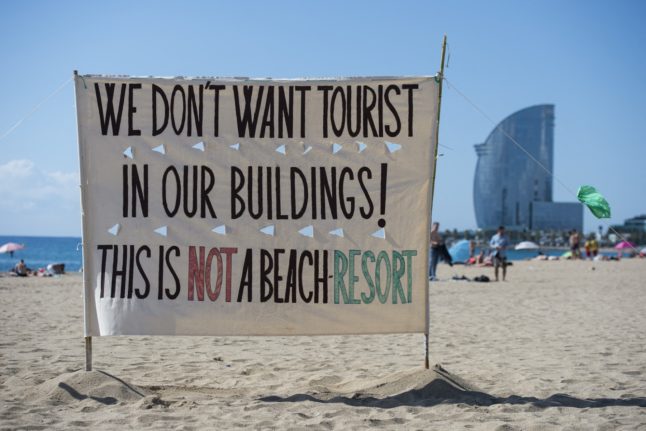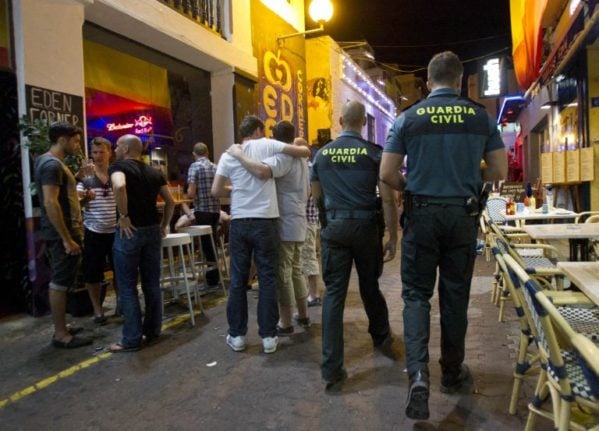The Spanish tourism sector continues to grow, but so does opposition to it.
Increasingly in Spain in recent years, anti-tourist sentiment (sometimes veering into anti-digital nomad sentiment) is on the rise, and much of it is born from frustrations about mass tourism and gentrification and their impact on Spaniards.
READ ALSO: Why does hatred of tourists in Spain appear to be on the rise?
In 2000, 46.4 million tourists visited Spain. In those days, travellers (often from Northern Europe) flocked to the coasts to stay in the hotel blocks right on the beach. The classic Spanish holiday, if you will.
But things are changing. By 2023, that figure had nearly doubled to 85.3 million.
Yet during those 23 years hotel accommodation grew by just 7 percent. This statistic, cited by Juan Molas, President of Spain’s Tourist Board and cited in Spanish daily El País, reveals a lot about the Spanish tourism sector and why efforts to try and combat mass tourism (or its negative effects, at least) have failed so far.
Molas’ statistic begs an obvious question: where do the rest of those tourists now stay, if not in traditional hotels?
Increasingly, in short-term accommodation such as tourist rentals and, in recent years, Airbnbs.
READ MORE: ‘Get the f*ck out of here’ – Málaga plastered with anti-tourism stickers
There have been regular protests against mass tourism around Spain in recent months, notably in places like the Canary Islands and Málaga.
Anti-tourist graffiti has appeared in places such as Barcelona, Valencia, Granada, the Canary and Balearic Islands, places that face the brunt of mass tourism in Spain. Locals complain that the proliferation of tourist rental accommodation depletes the affordable housing stock, inflates the local property market, and prices them out of their own neighbourhoods.
Often, these sorts of tourist rental accommodations are unlicensed and illegal. In Madrid, for example, there are tens of thousands of tourist apartments in Madrid available through platforms such as Airbnb and Booking, and yet recent findings show that barely five percent have a municipal tourist licence in order to operate legally.
“Neither the central administration, nor the regions, nor the town councils have done their homework on the illegal [accommodation] offer, which is the most important scourge of tourism in Spain,” Molas says.
Though the problem seems obvious to many, including experts like Molas, some regions of Spain have focused on other ways to try and limit mass tourism… and they haven’t really worked so far.
READ ALSO:
- The plans to limit foreign property buyers in Spain’s Balearics
- Spain’s Balearic Islands want to limit number of tourists
Tourist tax
Tourist taxes made big news in recent weeks when Venice began charging tourists on day trips to visit the tourist hotspot.
In Spain, Catalonia and the Balearic Islands are the only two regions that have implemented tourist taxes so far, although not with the express aim of reducing the number of visitors.
Rather, Catalonia taxes overnight stays while the Balearic Islands taxes possible environmental damage. Visitor arrivals have continued to rise despite the taxes.
In the thirteen years since the tax was introduced in Barcelona, tourist numbers have risen from 14.5 million to 18 million. Importantly, a moratorium on hotel construction has been in place in the Catalan capital since 2017, which has led to an exponential growth in tourist rental accommodation in the city.
In the case of the Balearic Islands, the annual number of tourist arrivals has increased from 13 to 14 million in the six years in which the so-called ‘ecotax’ has been in force on the islands.
Limiting cruise ships
Coastal and island resorts in Spain have also tried to combat mass tourism by limiting the number of cruise ships allowed to dock there.
In 2022, Palma de Mallorca became the first destination in Spain and the second in Europe, after Dubrovnik in Croatia, to make an agreement with major cruise ship companies to establish a limit of three cruise ships per day, and specified that only one of them could bring more than 5,000 passengers ashore.
In places like Mallorca but also in Barcelona, enormous cruise ships previously docked and released thousands of tourists into the city at once.
But once again, like with the tourist taxes introduced, a limit on cruise ship numbers, although welcome, misses the point — cruise ship customers sleep on the ship, not in the real problem underpinning Spain’s mass tourism model: accommodation.
Tourist accommodation
Varying legislation restricting Airbnb-style rentals has already been introduced in recent years in cities such as Valencia, Palma, Seville, Tarifa, Madrid, Barcelona, and San Sebastián, with varying degrees of success.
The number of short-term rental accommodation has exploded in Spain. They are particularly popular with remote workers and among digital nomads with the foreign spending power to price out locals. Recent data shows that in the old town of Seville, over half of residential homes are used for tourism. In the area of Madrid’s Puerta del Sol, 28.3 percent are tourist apartments, while the figure stands at 18.3 percent in the centre of Valencia.
READ MORE: How Spain’s Asturias region plans to limit short-term holiday lets
Tourist taxes and limits on cruise ship numbers are welcome. But they appear to be doing little to tackle the true underlying problem with Spain’s mass tourism model.
For now, measures are being rolled out largely on a regional level, but it may require the national government to step in and legislate, as it did when it scrapped the Golden Visa earlier this year, although again the effectiveness of this measure has also been questioned.
READ MORE: Is Spain’s decision to axe golden visa about housing or politics?
Increasing the social housing stock more generally would also go some way to alleviate the pressure on Spaniards struggling to pay rent or even find a home.
Tourism is a double edged sword in Spain. The tourism sector has long made up a significant proportion of Spanish GDP and provided employment for locals, but the model it currently has is outdated, it inflates property markets, angers Spaniards, and creates tension between tourists and locals.
In 2023, international visitors spent €108 billion in Spain, 17 percent more than in 2019. Spanish travel industry association Exceltur forecasts that in 2024 it will surpass €200 billion for the first time.
READ ALSO: ‘The island can’t take it anymore’ – Why Tenerife is rejecting mass tourism



 Please whitelist us to continue reading.
Please whitelist us to continue reading.
This article is so pro tourist it if frankly sad. It points the finger at the wrong groups. In the end, tourists always have a choice and tourism? Well, tourism is nothing but low pay jobs irrespective of the country.